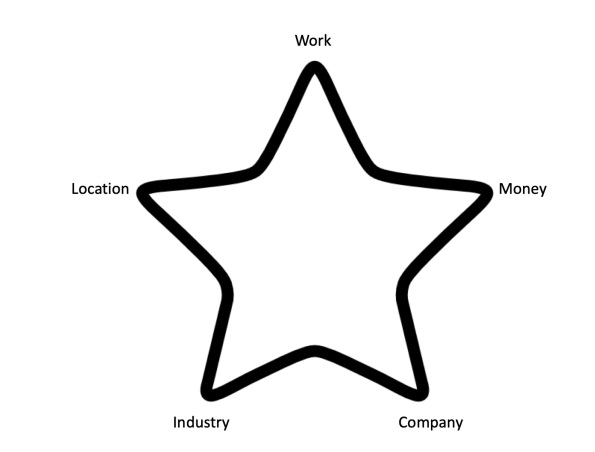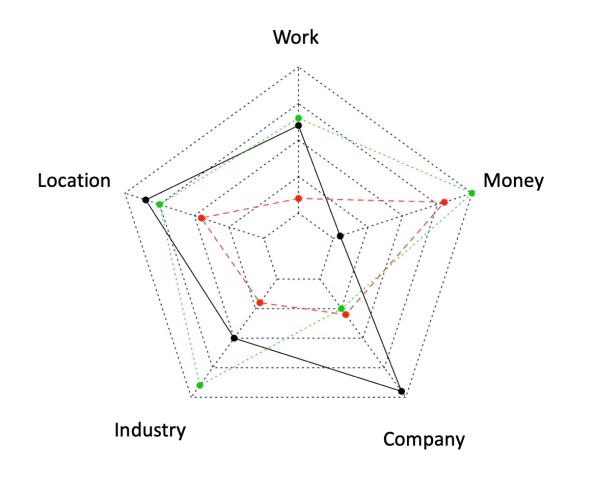Should I take that job?
A few weeks ago someone posted this question, online, (and I paraphrase) ‘ someone I know has been offered a job that pays her 5000 less than she is being paid today. Should she take it?’ This resulted in many responses, some for and some against the move.
As I thought about it, I came up with 5 factors to help those looking for ways to construct a framework to help one decide how to take the next step.

The work: What will you actually do? This is, obviously, very important because this is what you will do every hour of every day that you get paid. If you are going to get paid a million dollars and your work is going to be cleaning blood stains from crime scenes you are going to be neck deep in solvents, cleaning material and visiting odd places. As you can see, therefore, it is vital that you find out as much as you can about the actual work and see if it is something you can do. And even if you can do it will you enjoy doing it? If you are signing up to be an analyst there will be numbers and xl sheets involved. Whereas if your job will be in content, you will need to be able to write words that others will want to read. Will you enjoy it? Don’t get swayed by grand sounding words like strategy, paradigm, innovation and so on. While those are surely what the company does, it may be done only by the folks on the 32nd floor and not by you on the 11th. Atleast on day 1. Dig into the specifics of your day to day activity and gauge for yourself, your ability and level of comfort.
The money: How much will you get paid? Usually deals get made or broken over the compensation. When all is said and done, the bank balance at the start of every month should make you happy. Before talking money to anyone, do some research on what someone with your expertise and experience should be getting paid. Be mindful of the context of the compensation. Talking on the phone would be a highly valued skill in a call centre and you could get paid well for it, not as much in a massage parlour. So depending on where you are applying for the job the compensation would vary. You may prefer the massage parlour for any number of reasons (which I would be keen to know) but then be aware that it will only pay what they value the job at. Then it is entirely possible that you have done all your homework but the money being offered is not where you’d like it to be. If the other factors mentioned here are good, then your decision may be that the lower compensation is an investment you are making in yourself that will help you grow so that when you cash that investment somewhere else, or later in time in the same place, the returns will be worth it.
The company: Which company will you work at? You may be doing great work and being paid well for it as well, but if it is not a great company then is the work that you will be doing, the primary activity of that company? For a fashion designer Hermes is a great place to work. Not so much for a chef. Of course every company will have need for more generic professionals like marketing, sales IT, finance and so on but an IT person at IBM would have a significantly different experience from being an IT guy in an advertising agency. Based on your experience and the job shortlist the company you’d like to work in. Next.. is the culture one where they eat their young ones? Or their old ones? Or neither. Some companies thrive on internal competition others focus on collaboration and team building. Depending on the kind of person you are, you may prefer one over the other. How about training? Does the company train and grow its employees or is it sink or swim? And probably another important aspect to be aware of would be the company reputation, among your own friends and family. We all have some shallow friends and ignorant family members but who have a wide social network. You want to make the right impression with them. Sort of the difference between working at Acme sanitary ware and Unilever Domestic Care .
The industry: So it’s good work, good pay in a good company. But what about the industry you will be working in? Sometimes there could be issues to do with ethics and morality like say tobacco companies. Of course given the way the world is moving, more industries like automotive, fuel, plastic, finance and a whole bunch of others are being viewed with suspicion as well. There are some industries that are in decline like coal, steel, kindness and so on. Some industries are booming like wind, solar, social media, hacking. Some are solid but dull like fertilisers, shoes, insurance. You want to be in an industry that has a good future. While predicting what will be around for a generation is a tough task, it is important that you keep this in mind while deciding your job move.
The location: And finally something we don’t consciously look at but is at the back of our minds. Where do you have to go to work every day? Is it going to be a 2 hour commute to a tech park with no parking? Is it going to have you relocate to a village with no running water? Is it going to be in a glitzy building with a view of the mountains, or the ocean? While some of us would want to be able to walk to work, some may want the distance to day dream. Some jobs are necessarily tied to some locations. Like some jobs can only be performed in factories. Others may only be done in the front office. So think about the location when you are deciding your job.
So those are my 5 factors to help you guide your next move. It will be a rare occasion that you will get something that ticks all the boxes. Some level of optimization will be needed to help you decide. Maybe what you could look at is creating a scale from 1 – 5 for each of these factors and rank against each for the opportunity (or opportunities) you are evaluating.

This could help you to get to a rational approach to deciding whether that 5000 drop is a good move.
Good luck.
Interesting article. I think we should try this before taking a new job.